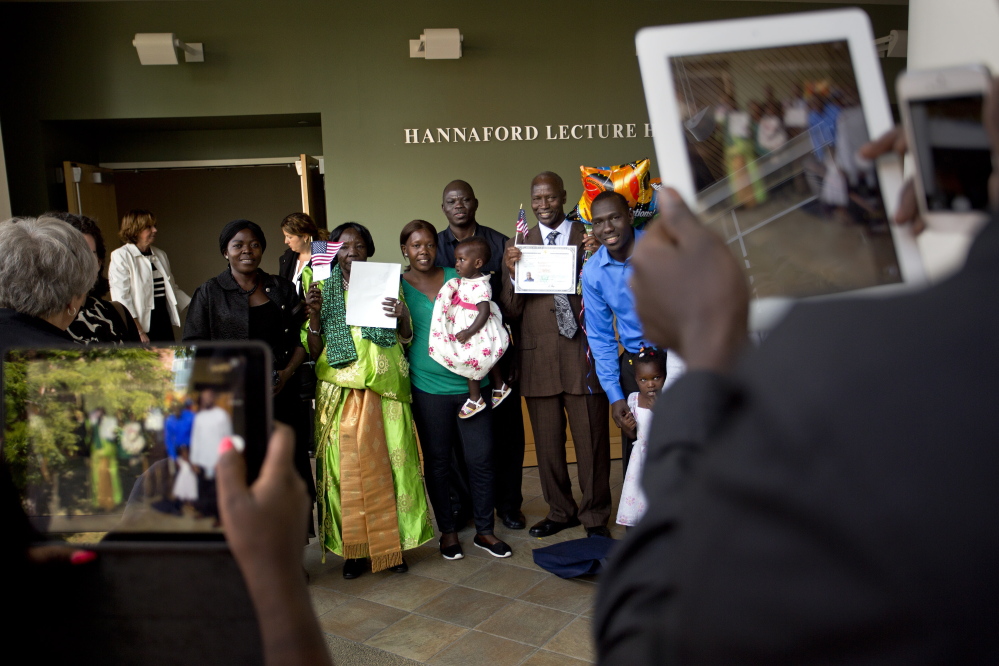Twenty-month-old Sura Salah squirmed while her mother waited anxiously for something young Sura already had – U.S. citizenship.
Enas Salah and 85 other people listened attentively as an ensemble of Deering and Portland high school students played chamber music, a prelude to Wednesday’s citizenship ceremony at the University of Southern Maine’s Abromson Center. Coming from 39 countries around the globe, many of them would not recognize the song, “Somewhere Over the Rainbow,” though its message would resonate.
Adil Salah described how he, his wife and their children fled Iraq in 2008 for Turkey because of danger and constant fear.
“They kill people, the terrorists. It’s very dangerous. For safety I take my kids. You’re looking for safety and a country for your family,” said Salah, who is already a U.S. citizen. Salah worked as a barber in Mosul, and even that was perilous. “The terrorist don’t like how you cut hair. . . . In America, you have the law.”
It was an example of something simple that many Americans take for granted, but which many people who have struggled to get here cherish.
U.S. District Judge George Z. Singal led Wednesday’s naturalization ceremony as a part of a special session of the U.S. District Court of Maine. The event was one of two dozen similar events held across the country in recognition of Constitution Day.
Row upon row of people from as far away as Afghanistan and Vietnam, from countries wracked by war, poverty and totalitarian regimes, raised their right hand and took the oath of citizenship, delivered by U.S. Circuit Judge Kermit Lipez.
Once the new citizens had sworn to defend the country and the Constitution, Singal congratulated them.
“You have come from many countries, but I’m proud to tell you, you have become Americans,” he said. He then coached the new citizens on flag etiquette. They all placed their right hands over their hearts as students of Holy Cross School in South Portland led them in the Pledge of Allegiance, and again as Lillian Black of Cumberland sang the national anthem.
Students from the Dora L. Small Elementary School in South Portland recited the Preamble to the Constitution. As the students told of securing the blessings of liberty, they each held a small flag representing one of the countries that their ancestors had left for this land.
The new citizens, some with fractured English and scant schooling, appeared to have little in common with the school children assembled on either side of the auditorium and the wise men of the judiciary seated on the dais.
But Singal demonstrated that appearances can be deceiving.
Draped in the black robes of his office, he told the rapt gathering his own story.
“I took the same oath of citizenship to this country that you did today,” Singal said, holding up the certificate of naturalization that he keeps in his desk as a reminder of the day in 1955 when he was 10 years old and became a U.S. citizen in Bangor.
Singal’s family had lived in eastern Poland and fled after the Nazis invaded and started rounding up Jews, according to a video about him for the U.S. Courts. His mother was pregnant with him when she escaped and he was born in a refugee camp. His entire extended family was killed.
On Wednesday, Singal told the new citizens how his family came to the United States in 1949 as immigrants after living for four years in the refugee camp. He spoke no English. He, his mother and his sister came with almost no possessions.
“My mother, even though she had few belongings like you, carried to his country the most precious of possessions: a hope for a better future for herself and for her children; that this country would both bless and be blessed by her children; and that her children would thrive and prosper on this soil of opportunity.”
Singal reminded the new citizens that now they are not merely living on American soil, they are Americans.
For each that meant something different.
For Coast Guard Seaman Denis Kirabo, from Uganda, it meant the opportunity to pursue an education in math and a science career in the service.
“I’ve been looking forward to this for a long time,” he said, wearing a crisp dress blue uniform and a white hat.
For James Fan, being in this country means being able to play basketball and run track for his high school. Back in China, the Westbrook High School sophomore would have to be constantly poring over books, he said.
“They just give you pages and pages. It’s all about work and study. Here I have a lot more free time, time to do things I like,” Fan said.
Each of the new citizens received a blue cloth bag, a sort of survival kit for citizenship.
Inside, there was a small American flag provided by the Daughters of the American Revolution and a copy of the Mayflower Compact, which outlined the Pilgrims’ principles of civil and religious freedom, concepts that formed a foundation for the Constitution.
They also found a copy of the Constitution. Singal directed their attention especially to the first 10 amendments, the Bill of Rights.
And there was a voter registration card provided by the League of Women Voters.
Afterward, family and friends took photographs and celebrated.
Enas Salah chased her precocious daughter across the lobby outside the auditorium. She was very happy and a little relieved.
“Everything is very good in America,” her husband said. “Life, safety, people, government – everything.”
David Hench can be contacted at 791-6327 or at:
dhench@mainetoday.com
Twitter: @Mainehenchman
Send questions/comments to the editors.





Comments are no longer available on this story